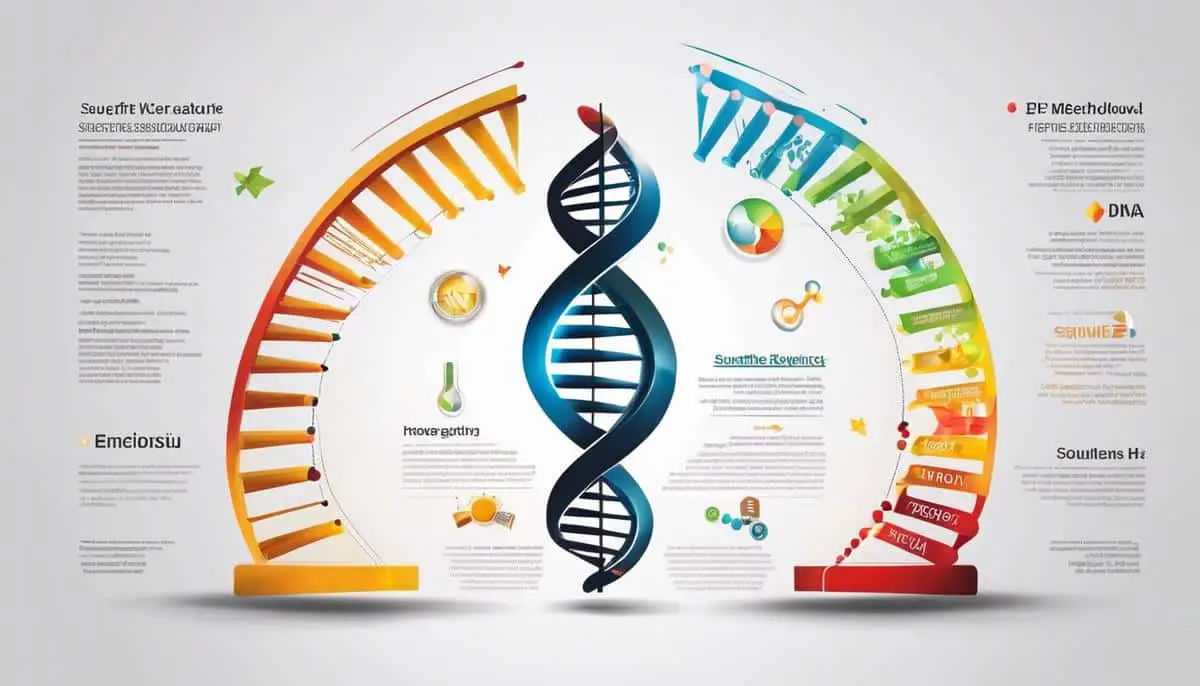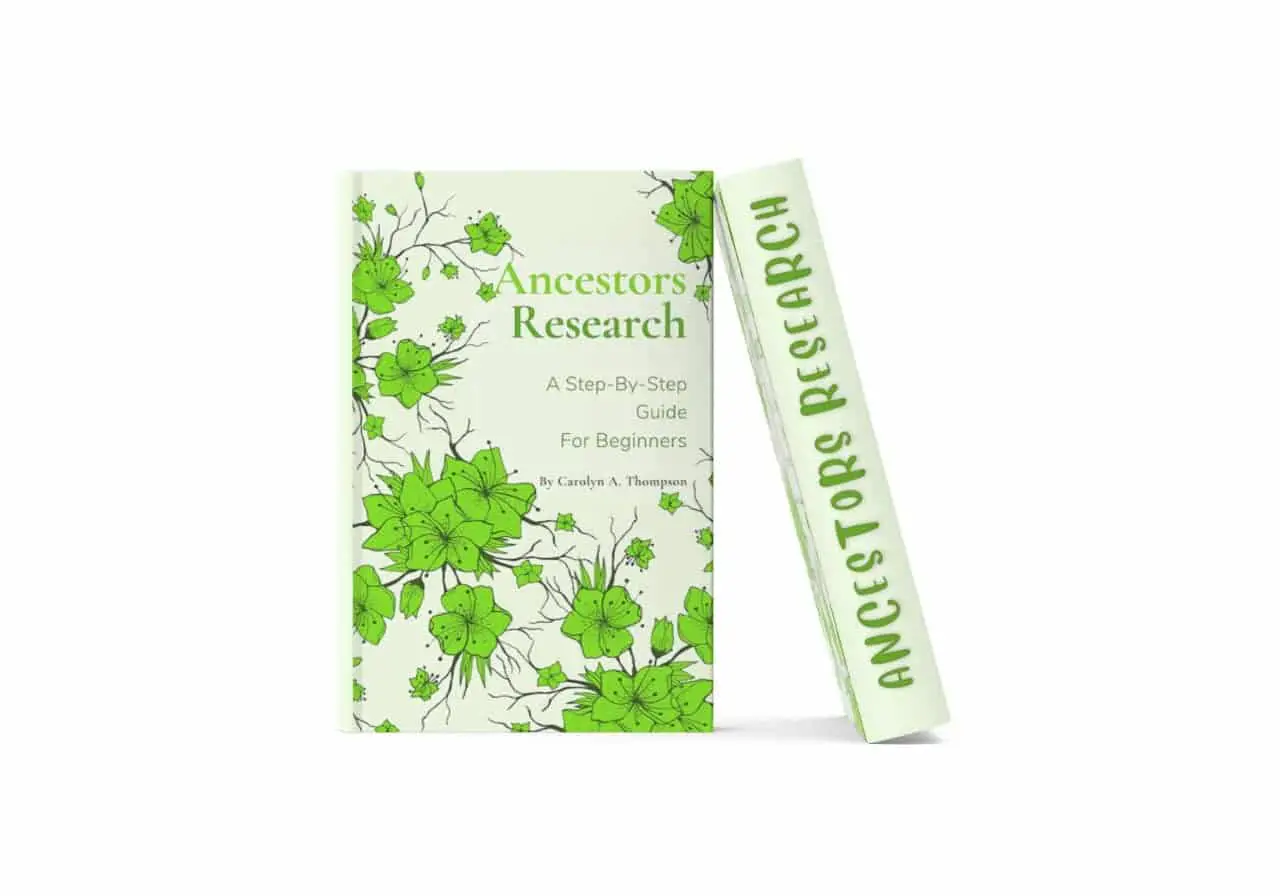Ancestry Ethnicity Results have become a focal point for many individuals delving into DNA testing, a journey that not only uncovers ethnicity but also connects us with our historical roots.
These increasingly popular tests are based on sophisticated scientific principles and require nuanced interpretation.
To fully understand these results, one needs to know about the genetic data, be aware of its limitations in terms of accuracy, and put the results in the context of history and geography.
One should also think about the ethical implications and the potential for further research. This article serves as a comprehensive guide to help you navigate the complexities of interpreting your ancestry ethnicity results.
For those seeking deeper insights, the companion article “Understanding and Utilizing Your DNA Test Results” is a must-read. It offers additional information and practical tips to effectively use your DNA test findings, thus enriching your overall understanding of your genetic ancestry.
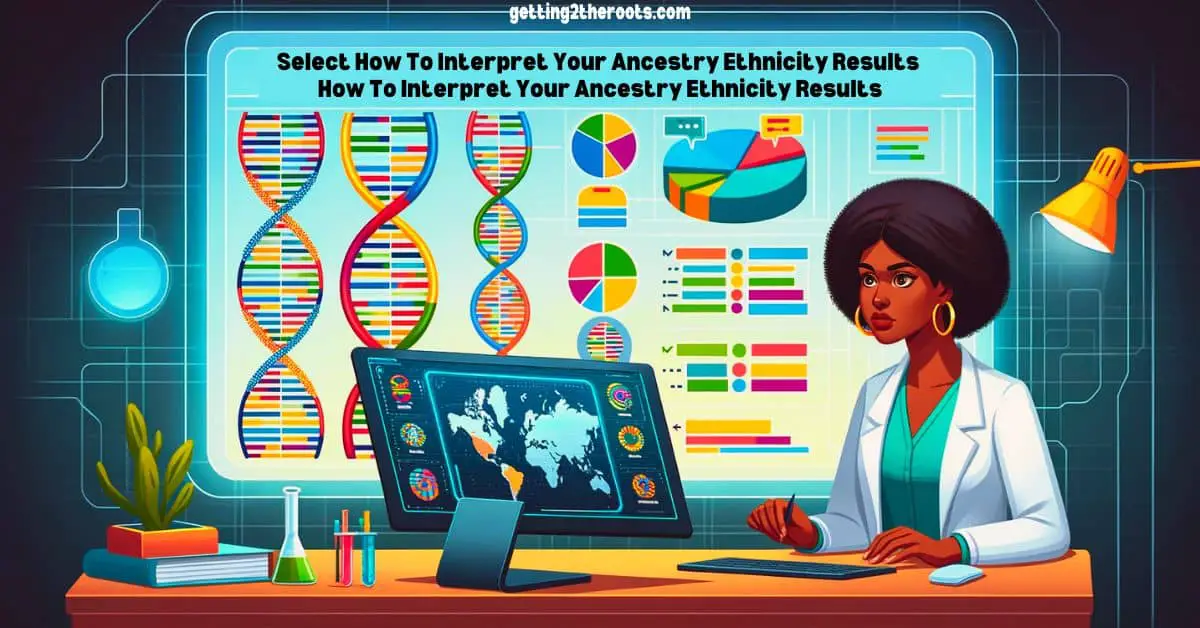
How To Interpret Your Ancestry Ethnicity Results: An Overview
Genetic science is the foundation of ethnicity DNA testing. Our bodies contain around 20,000 genes, each of which is made up of DNA.
Incidentally, it’s in the sequencing of this DNA where the magic, or rather, the science, of determining ethnicity lies.
Every person has genetic markers, variations within the DNA sequence, that are distinct to different ethnic groups.
These specific markers have been identified and categorized by genetic researchers over the years through extensive databases.
HOW TO INTERPRET YOUR ANCESTRY ETHNICITY RESULTS: DNA SAMPLING AND GENOTYPING
When a DNA sample is taken, the immediate step involves extracting and isolating the DNA present within the sample.
This isolated DNA is then subjected to a process called genotyping. Here, the DNA is examined for the presence of hundreds of thousands of these ethnic-specific genetic markers.
The higher the concentration of a specific marker, the greater the likelihood that the individual shares ancestry with the ethnic group associated with that marker.

ANCESTRY ETHNICITY RESULTS: THE ROLE OF COMPUTER ALGORITHMS
Now, to approach this from a purely genetic perspective is, unfortunately, an oversimplification of the complexity behind ethnicity DNA tests. Enter computer algorithms, the unsung heroes of the process.
Once the genetic markers have been identified, an algorithm is tasked with comparing these markers to a reference dataset.
This dataset is a compiled set of genetic markers from individuals with established geographic ancestry.
The algorithm analyzes the similarities and differences between the genetic markers in the individual’s DNA and each group in the dataset.
HOW TO INTERPRET YOUR ANCESTRY ETHNICITY RESULTS: UNDERSTANDING STATISTICAL PROBABILITIES
The complexity continues with the addition of statistical probability. The output yielded by these comparative analyses is not definitive but rather reported as a statistical probability.
Consequently, results are returned as percentages, statistically representing one’s ethnic composition. The higher the percentage, the greater the chance of having ancestry from that geographical region.
Limitations And Future Directions In Ancestry Ethnicity Results
Importantly, it must be noted that the received results are limited by available reference datasets. They are constantly evolving and as more people take these tests and databases grow, the task of identifying ethnicity becomes incrementally more accurate.
Also, one must consider that human populations have migrated and mixed over the course of centuries, adding layers of complexity to the interpretation of these tests.
ANCESTRY ETHNICITY RESULTS: CONCLUDING THOUGHTS
In conclusion, ethnicity DNA tests employ a multi-pronged scientific approach consisting of genetics research, advanced computer algorithms, and statistical probabilities.
It doesn’t provide a clear-cut rubric of one’s ethnicity but presents a nuanced analysis of likely ancestral origins.
A scientific inquiry into one’s self, it presents a fascinating intersection of molecular biology, computation, and statistical analysis to unravel the mysteries of our past.
As we navigate this realm of self-discovery, let’s ensure we appreciate and understand the scientific rigor and complexities that make it all possible.
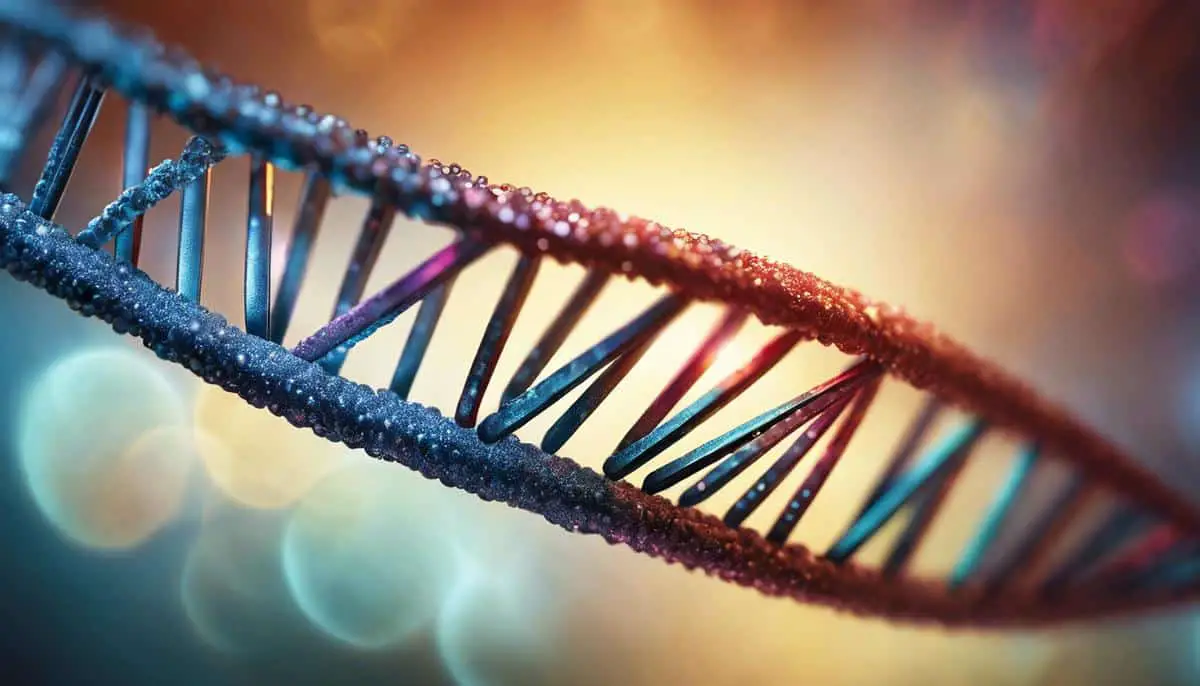
Ethnogenesis Unveiled: Reliability And Precision Of Ethnicity DNA Tests
Venturing into the complex world of genomic research following the dawn of next-generation sequencing and advanced bioinformatics tools, we find ourselves extorted by the captivating allure of population genetics.
In particular, the contemporary fascination with ethnicity DNA testing provides a glimpse into the captivating quest for ancestral roots that many individuals are eager to undertake.
The real question that piques our inquisitive minds, however, is the reliability and precision of these ethnicity DNA tests.
Understanding the Complex Nature of Ethnicity DNA Tests
It pays to note the complex nature of the process involved in these tests. Ethnicity DNA tests are based on comparative genomics, a complex method.
This process is prone to slight inconsistencies due to various factors. As a result, these factors affect the tests’ reliability and accuracy. This article elucidates the various factors at play.
The Impact of Sample Size and Diversity in Databases
One crucial determinant of a test’s precision lies in the sample size and ethnic diversity of the database employed by the testing company.
Larger, more diverse populations confer higher precision, considering the superior array of genetic markers available for comparison.
However, the demographical discrepancies within these databases can result in biases towards the well-represented ethnic groups, thus influencing the test results and posing potential caveats to their accuracy.
The Fluidity of Ethnicity and Its Implications
- Another component affecting precision is the changing understanding of ‘ethnicity’ over time.
- Notorious for its fluidity, the concept of ethnicity is largely contingent on self-identification, shared culture, and history.
- The commutation of genetic markers into ethnic estimates is, hence, not devoid of challenges.
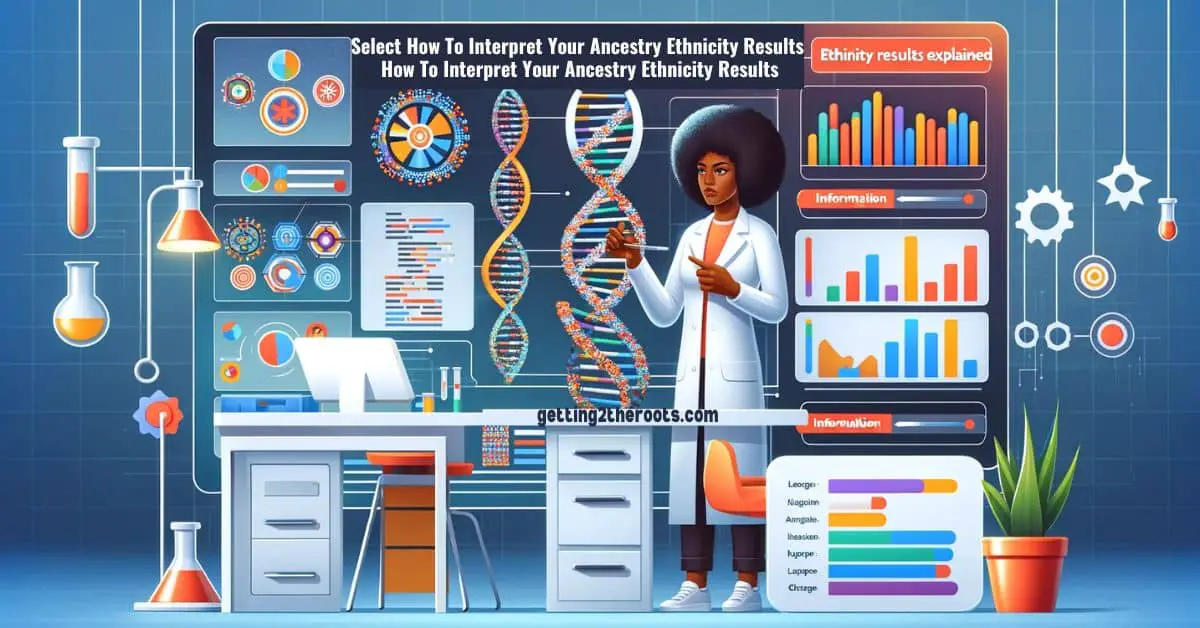
Admixture and Genetic Complexity
Furthermore, the classification of genetic variants in ancestral groups can be ambiguous, considering human history’s inherent complexity.
For example, the concept of ‘admixture”—interbreeding between two or more previously isolated populations—adds layers to the ethnic estimation process.
Genetic reshuffling through every generation renders clear-cut identification of ethnic origins impossible, as elements of DNA might be lost, skewing the projected ethnic estimations.
Variability in Genomic Regions and Testing Methods
Lastly, the genomic regions targeted for analysis can significantly impact the precision of ancestry ethnicity results.
Intricacies arise as testing companies utilize different autosomal DNA and/or sex chromosomes and mtDNA for their tests.
Each provides distinct information about the maternal and paternal lineages, respectively, altering the breadth and depth of the inferred ancestral context.
If you’re intrigued by genetic ancestry, I recommend two articles that offer unique insights.
“Pathways To The Past | African American Female Ancestors” delves into maternal lineage, especially in the African American community, highlighting the rich stories DNA testing can reveal.
“Secrets of Paternal Lineage DNA: Intricacies” examines how different DNA tests impact our understanding of paternal lineage.
Each article sheds light on the complexities and fascinating details of tracing both maternal and paternal ancestors through DNA.
Conclusion: The Intricacies of Ethnicity DNA Testing
In a nutshell, the outcome of ancestry ethnicity results is an intricate choreography of multitudinous factors that craft a fluid mosaic of our past.
The dance between genomics, evolutionary history, and computational modeling is what shapes the reliability and precision of these tests.
Let us remember to treat these tests as illuminating, though not definitive, guides to the captivating tapestry of our ancestry.
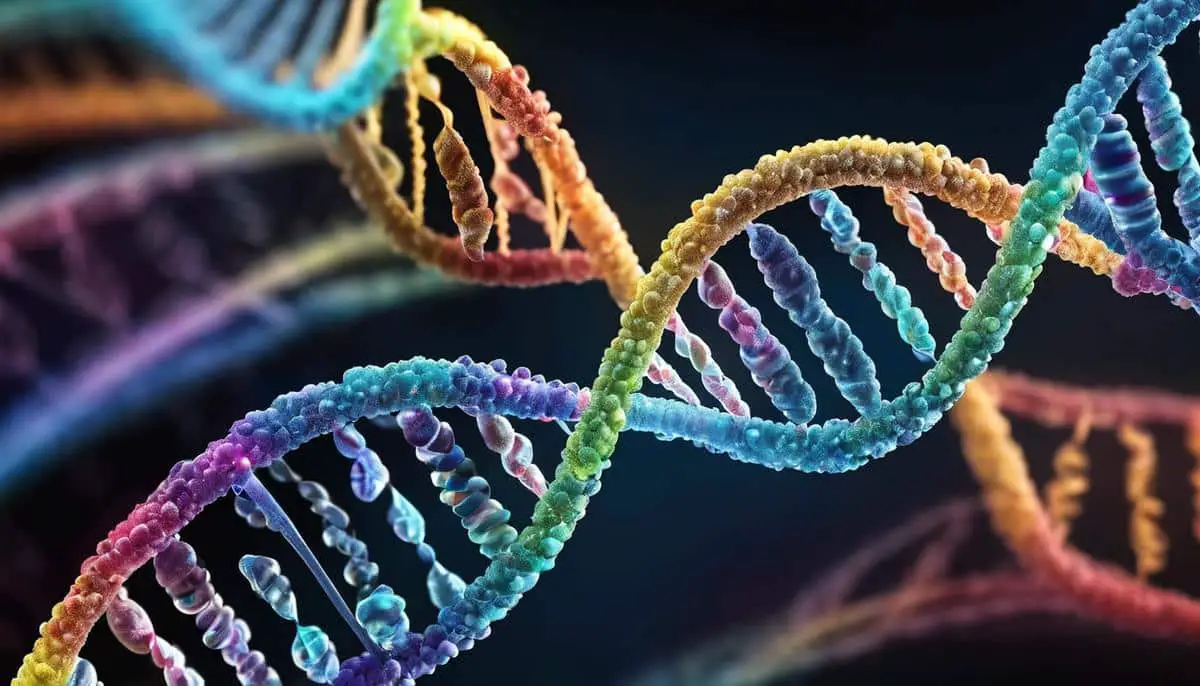
Interpreting Ancestry Ethnicity Results: Historical and Geographical Contexts
To deepen our understanding of ancestry ethnicity results, it is vital to appreciate the principal roles played by historical and geographical contexts.
This involves an intriguing blend of genetic data with historical narratives and geographical pathways to project a more convincing matrix of human ancestry.
Historical context displays its import through past occurrences such as colonization, slavery, conquest, and migrations, which have significantly influenced the genetic makeup of present-day populations.
For example, the widespread migration during the era of colonialism significantly intermixed different gene pools.
This led to an increased genetic variation that subtly influenced our interpretation of ancestry ethnicity results.
Such historical movements play a crucial role in understanding the nuances of ethnicity DNA, often reflected in ancestry ethnicity results.
Accounting for such historical events can illuminate the origins of untraceable genetic sequences and explain segments of DNA that might seem inexplicable or contradictory.
Geographical Context and Its Impact on Ancestry Ethnicity Results
Geographical context is key to understanding ancestry ethnicity results. Our planet is divided by natural barriers like oceans, deserts, mountains, and forests.
These barriers once limited human movement. Now, they help explain isolated genetic traits in different areas. These traits are important for interpreting ancestry ethnicity results.
Considering geography, we get clearer insights into these results. Genetic markers linked to specific places can reveal ancestral origins. This enhances the accuracy of ancestry ethnicity results.
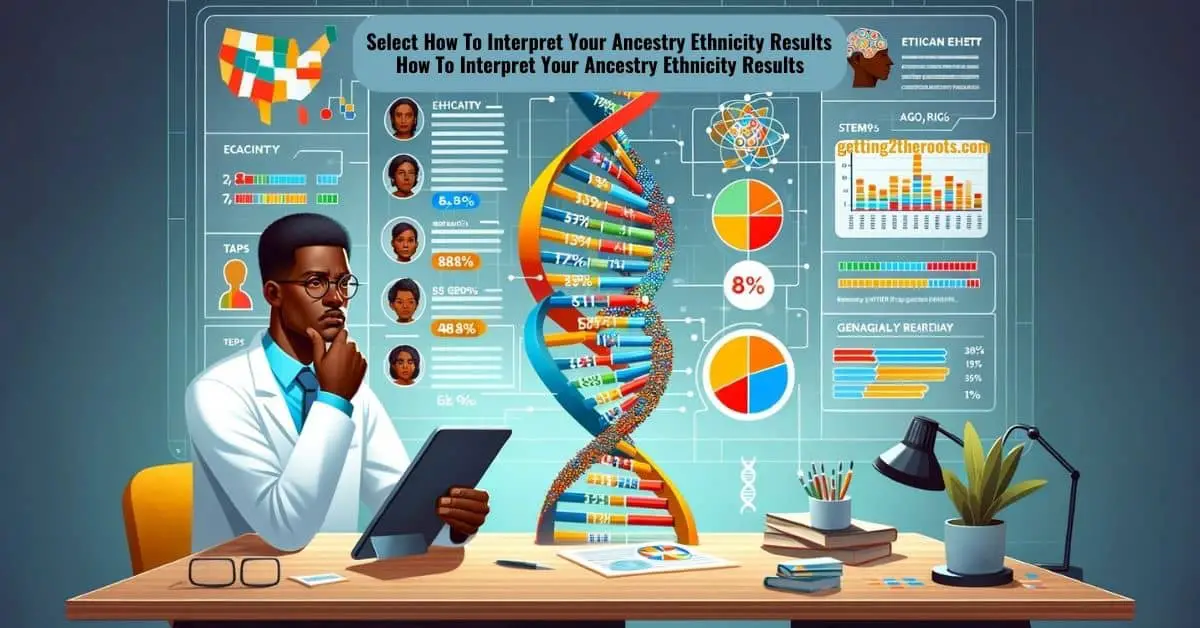
Integrating Contexts for a Refined Interpretation
Adding historical and geographical contexts to ethnicity DNA results makes them more precise. Otherwise, these results might be oversimplified guesses of one’s ancestry.
However, even with this added depth, interpreting these results is still largely about probabilities. Think of each ethnicity’s DNA result as a palimpsest: complex, with layers of human history, evolution, and interactions.
Moreover, disagreements regarding ethnic classification surface due to shifting definitions of ethnicity over time, which play into the fluidity of ethnicity in genetic mapping.
DNA testing firms have their own proprietary methods for dealing with these issues. Geneticists often recognize the socially constructed nature of ethnicity, cognizant of the limited biological basis for clear-cut ethnic divisions.
The Challenge of Combining Genetic Data with Subjective Ethnicity
On its own, genetic data doesn’t tell the complete story. However, when paired with a comprehensive understanding of history and geography, we can extract further probable depths from our ancestry.
The challenge lies in combining the objective data from our DNA with the subjective nature of ethnicity, considering the bias, imprecision, and fluidity in the sources and definitions.
Conclusion: Ethnicity DNA Testing as a Holistic Narrative
In essence, by integrating historical and geographical contexts into the interpretation of ethnicity DNA results, what emerges is a holistic portrait of our past.
Far more than just a pie chart percentage, it’s a narrative of historical migrations and environmental adaptations, a story of survival and evolution—a human story.
Nonetheless, it should always be remembered that an ethnicity DNA test is a tool—a scientifically remarkable tool—that can help uncover the fascinating story of our genetic heritage
But as we weave our narratives, let us temper our passion for discovery with an understanding of the inherent bounds and limitations.
These tests offer a window into our past, but they are neither definitive nor absolute. They are, however, an immensely vital part of our unfolding journey to understand who we are and where we come from.
Our DNA is not simply an archive of our ancestral past but a living, dynamic record of our species’ fascinating journey through time.
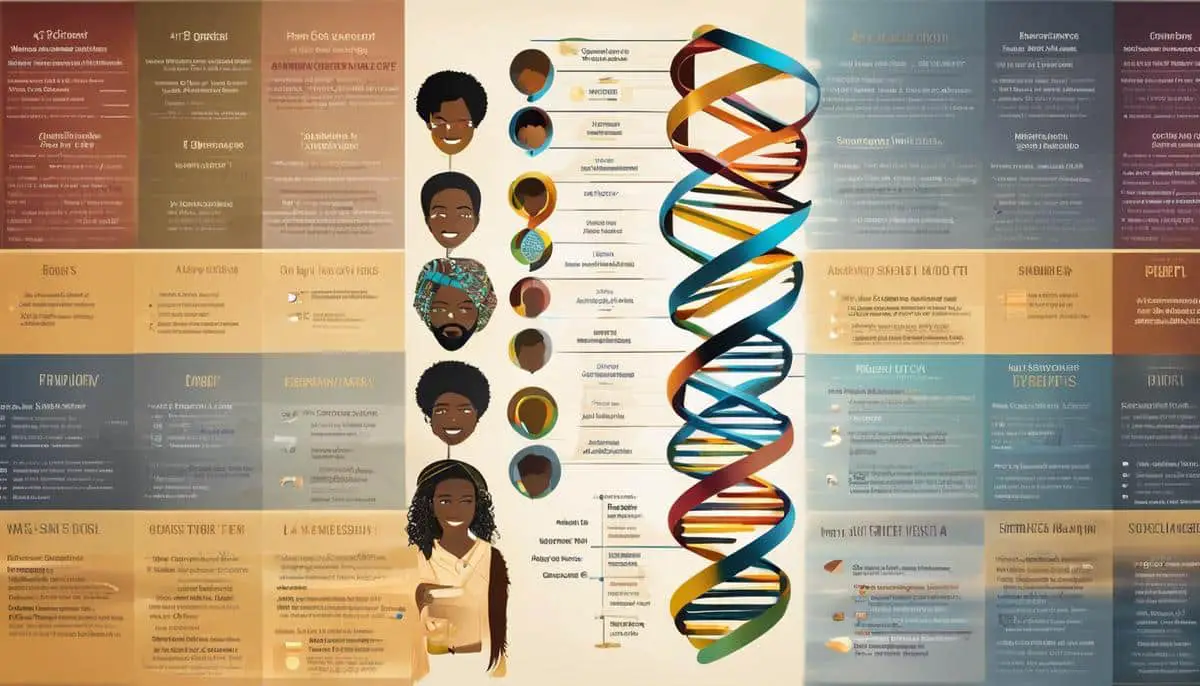
Ethical Complexities in Ethnicity DNA Testing: Navigating Ancestry Ethnicity Results
Amid the intersection of genomic sciences, computation, and human anthropology lies the burgeoning field of ethnicity DNA testing, a novel means of tracing ancestral roots.
As enticing as it appears on the surface, delving into the ethical considerations involved in ethnicity DNA testing paints a significantly more complicated picture.
The Elusive Accuracy and Ethical Dilemmas
Absolute accuracy in ethnicity DNA testing is an elusive concept due to the inherently multifaceted nature of ethnicity.
Mutations in DNA sequences occur sporadically across generations and throughout global populations, richly diversifying the human genomic landscape.
Such variations serve as crucial genetic markers for these tests, but they are hardly ever mapped neatly onto conventional understandings of ethnicity.
Ethical queries, therefore, abound regarding the oversimplification or potential misinterpretation of genetic test reports by consumers.
Potential Misuse of Genetic Markers
When genetic markers are used to delineate ancestry, chances for potential misuse become salient.
Given the broader sociopolitical climate, the potential for these tests to unintentionally fuel misconceptions or prejudices about ethnic superiority or classification can’t be overlooked.
Thus, the ethical need for comprehensive and contextual interpretation of results becomes pressing; genetics should not be misconstrued as deterministic of one’s identity, capabilities, or worth.
Privacy and Confidentiality Concerns
In direct correlation with the question of intent and interpretation is the issue of privacy invasion. The extensive collection of DNA samples can lead to the biologization of race and ethnicity, either inadvertently or deliberately.
This raises significant concerns about privacy and confidentiality. As companies collect and maintain vast genomic databases, the possibility looms for misuse of this sensitive information.
Biobanks thus become arenas necessitating ethical oversight and stringent guidelines to safeguard against potential misuse or abuse of data.

Psychological and Sociological Impacts of DNA Testing
Ethnicity DNA testing also challenges the traditional perception of kinship and identity. These test revelations can drastically change personal and family narratives. They may disrupt familial identities or cause emotional distress.
This can lead to substantial psychological impacts, once again highlighting the intricate intertwining of ethical, psychological, and sociological considerations in DNA ethnicity testing.
Historical Context and Genetic Narratives
Furthermore, the truth about our ancestral origins can be unpalatable or even traumatic, considering the complex network of historical events such as colonialism and slavery.
The genetic traces of such histories can unravel intricate narratives about human migrations and geographical adaptations but also expose wounds of conquest, forced intermixing, or extinction of certain populations.
Consequently, an element of historical context, invariably twined with emotions and trauma, is introduced into the genomic narrative, which calls for sensitive and ethical handling.
Conclusion: The Need for Ethical Consideration in Genetic Exploration
In conclusion, handling the intricate tapestry of human genetics requires a delicate balance of scientific acumen and an empathetic understanding of societal nuances.
As we delve deeper into genetic exploration, it is crucial to tread lightly and respect the complexities of human identity.
We must also acknowledge the ethical implications of unraveling the secrets in our DNA. Ethnicity DNA testing can enhance our understanding of humanity’s journey through time.
However, we must be aware of its limitations and the ethical dilemmas it presents. The thrill of discovery ought to be tempered with respect for the enduring mysteries of human life.

Ways to Further Interpret and Apply Ancestry Ethnicity Results
Delving into the Phenomenon of Ethnicity DNA Testing: Further Interpretation and Considerations of Ancestry Ethnicity Results
There is no doubt that ethnicity DNA testing has the potential to shed light on one’s ancestry. However, it behooves us to consider the multifaceted nature of ethnicity and the greater implications of this branch of genetic science.
Ethnicity Beyond Genetic Markers
Ethnicity, a concept traditionally rooted in shared geography, language, culture, and history, has now witnessed an intersection with genetic data.
Yet decoding a person’s ethnic makeup cannot be fully achieved through genetic markers alone.
Ethnicity bears a high degree of social construct and transcends the biological confines DNA tests may suggest.
The resultant complexity is one of the inherent challenges of maintaining accuracy in ethnicity DNA testing.
Ethical Implications and Societal Impact
Genetic test results have profound implications extending beyond pure scientific knowledge. Ethical considerations come to the fore when interpreting these tests.
Genetic markers identifying ethnic origins can be misused or misinterpreted, sometimes falling into the hands of those harboring sociopolitical prejudices.
The misappropriation of genetic data can result in harmful societal biases, therefore necessitating the implementation of safeguards to prevent such misuse.
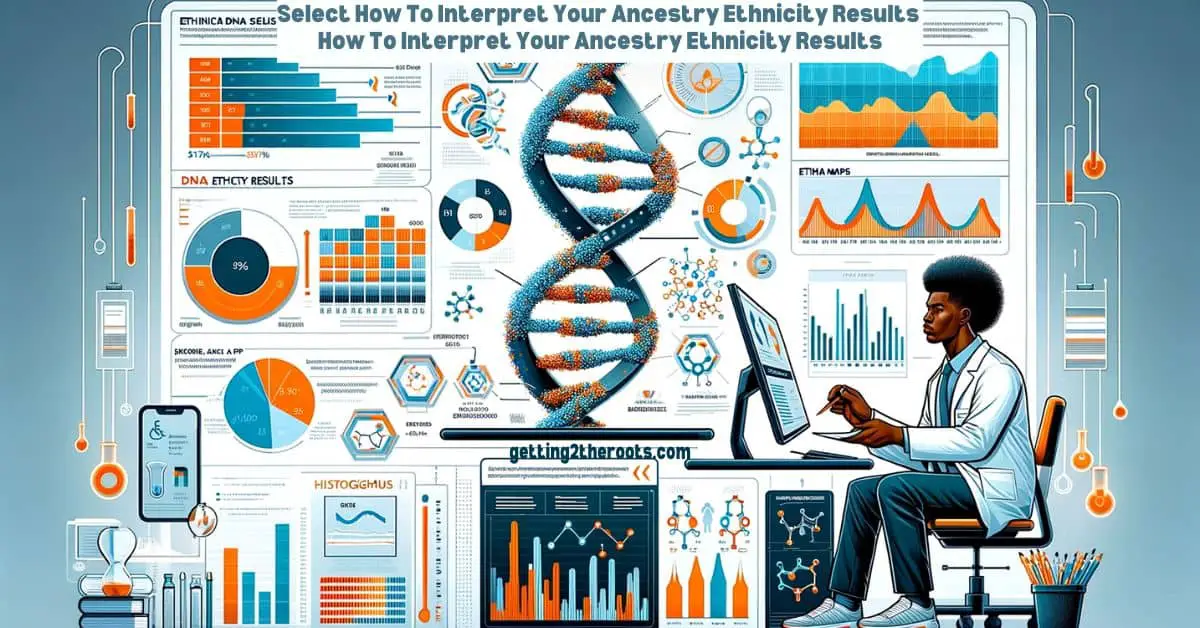
Privacy and Identity Considerations
Privacy and confidentiality concerns arise in the context of these tests as well. The handling and storage of genetic information must be regulated with the utmost caution.
Striking a balance between individual privacy and genetic exploration is a matter of critical concern.
Moreover, an individual’s sense of self, shaped by their perceived ethnic identity, may undergo considerable impacts with the uncovering of their genetic makeup.
A sudden revelation of a starkly contrasted ancestral origin can lead to psychological and emotional turbulence.
On the other hand, confirmation of oral histories and beliefs about one’s ethnicity can be empowering and identity-affirming.
Historical Context and Emotional Response
Unveiling genetic markers may also bring to the surface complex historical events and traumatic experiences.
Instances of forced migration, intermarriage, or colonization may lie etched in the gene sequences, and their disclosure may result in unexpected and profound emotional responses.
Such delicate matters warrant sensitive and ethical handling of genetic information.
Concluding Thoughts on Ethnicity DNA Testing
Indeed, ethnicity DNA testing is a tool teeming with possibilities. However, it is unequivocally important to acknowledge its limitations and the ethical dilemmas involved.
As we continue to explore the crossroads between genetics and self-discovery, we must do so keeping in mind the ever-present need to strike a balance between scientific exploration and societal understanding.
The complex tapestry of humans as a species involves far more than what can be revealed through DNA alone.
Embarking on a journey of genetic discovery means considering all the hues of historical, geographic, biological, and psychosocial influences that paint the intricate picture of our individuality.
Through the lens of DNA testing, each individual has the potential to become a historian of their ancestry and an explorer of their ethnic roots.
However, one must always remain cognizant of the complexity and nuance that this exploration entails.
- It requires comprehension of scientific methodology.
- Scrutiny of algorithmic accuracy, and understanding of historical and geographical contexts.
- Adherence to ethical considerations, combined with a zest to delve further into the findings.
Therefore, through a multifaceted engagement with these DNA results, individuals can derive rich insights, navigate the complexities, and truly own their narrative.
Ultimately, the DNA testing journey is as much about educating oneself as it is about unlocking the mysteries of one’s genetic past.

Conclusion
In the journey of self-discovery through DNA testing, we have explored the intricate layers of interpreting ethnicity results.
This guide has provided insights into the scientific, historical, and ethical dimensions of DNA testing, offering a comprehensive understanding of the process.
As we continue to delve into our genetic past, it’s essential to approach these findings with both curiosity and a mindful appreciation of their complexity.
Frequently Asked Questions About How to Interpret Your Ancestry Ethnicity Results
- What can DNA testing tell me about my ethnicity? DNA testing offers insights into your ancestral origins by analyzing genetic markers linked to various ethnic groups.
- How accurate are DNA ethnicity results? While DNA tests provide a good estimate of your ethnic makeup, they should be viewed as indicative due to varying factors like database size and genetic diversity.
- Can DNA testing determine my exact ethnic origins? DNA tests can indicate your likely ethnic origins but cannot pinpoint exact locations or communities due to genetic overlap and migration patterns.
- How do historical and geographical contexts affect my DNA results? Historical migrations and geographical barriers have shaped genetic diversity, influencing the interpretation of your DNA ethnicity results.
- Are there ethical considerations in DNA ethnicity testing? Yes, ethical considerations include potential misuse of data, privacy concerns, and the need for sensitive interpretation of results.

